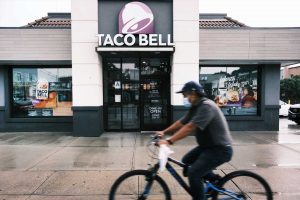Taco Bell tests 30-day taco subscription to drive more frequent visits

- Taco Bell is testing a 30-day pass for a free taco a day in Tucson, Arizona restaurants.
- Customers can redeem their Taco Lover's Pass until Nov. 24 at participating locations.
- Burger King and Panera Bread have created similar programs in the past for coffee to drive more frequent visits.
In this article
- YUM
The newest subscription service isn't to stream TV shows or movies. It's for Taco Bell's tacos.
Customers with the Taco Lover's Pass can order one crunchy taco, soft taco, spicy potato soft taco or Doritos Locos taco per day for 30 days straight on the chain's app. The cost of the pass ranges from $5 to $10 a month, depending on the location. The Yum Brands chain is testing the program across 17 locations in Tucson, Arizona from Sept. 9 to Nov. 24.
Other restaurant chains have also launched similar subscription programs, with mixed success. Restaurant Brand International's Burger King launched a coffee subscription for $5 a month in 2019 to help promote its breakfast menu but discontinued it several months later. Panera Bread, which is privately owned, launched its own version in 2020 that offered unlimited coffee and tea for $8.99 a month and the first three months free. Less than a year later, the program had nearly half a million paying subscribers.
Like Burger King and Panera, Taco Bell is likely hoping to drive regular visits to its restaurants from customers, building habits during the 30-day period. Since one taco isn't filling enough for most consumers, they might add more to their orders, too.
The pass could encourage more consumers to download and use Taco Bell's app as well. The chain launched a loyalty program through its app more than a year ago. Executives on Yum's latest earnings call said that Taco Bell loyalty members spend 35% more on their visits compared with their spending habits before joining the program.
Shares of Yum, which also owns KFC and Pizza Hut, have risen 18% this year, bringing its market value to $37.9 billion.
Source: Read Full Article
